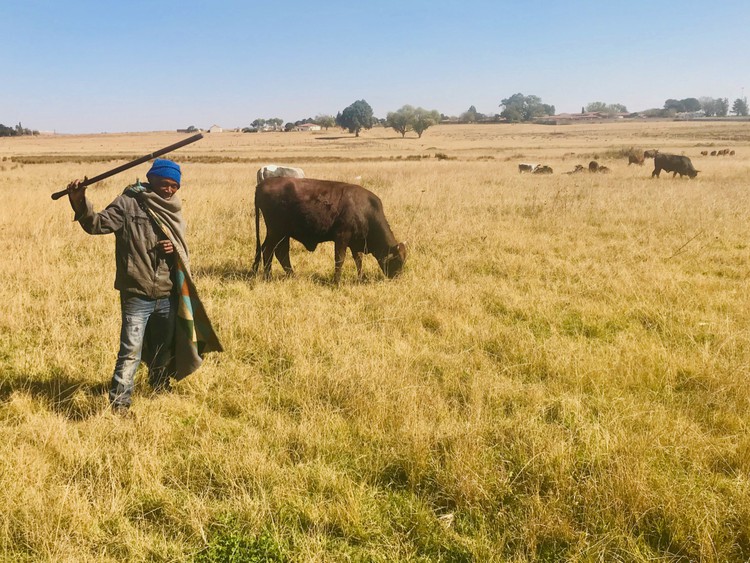
Kopano Lekau herds cattle and goats in an open field along Geluksdale Road near Brakpan from 8am to 6pm every day. Photo: Kimberly Mutandiro
7 June 2019
“People mistake me for a homeless man, but I’m just a poor country-born herdsman trying to make a living in Gauteng,” says Kopano Lekau.
“I’d rather be mistaken for a homeless man than see my eight siblings [back in rural Lesotho] starve,” he says.
Lekau, the third born in a family of 10 children, is 30 years old. He earns R2,000 a month herding cattle and goats in an open field along Geluksdale Road near Brakpan. He works seven days a week, from 8am to 6pm.
He dreams of seeing his brothers and sisters graduate college, an opportunity he never had. He also looks after his elderly parents.
Every morning at 6:30am he sets out on a seven-kilometre walk from White City township in Kwathema Springs to Langaville Extension 8 in Tsakane. Then he crosses Geluksdale Road from his employer’s home with 44 cattle and 15 goats.
The animals drink water at a stream in the middle of the vast Gelukdale grasslands which stretch to Brakpan.
He works on an empty stomach, saving every cent he can to send back home. He only eats in the evening. Sometimes he buys a R2 snack from street vendors. There are no berries or wild fruits in the grasslands and he is forbidden to drink milk from the cows he herds. But he is used to hunger, since childhood he says.
Lekau learned to herd cattle as a child growing up in rural Mafeteng, Lesotho. His family was too poor to keep him in school after grade 5. After initiation school, at age 17, he took full responsibility for his family’s cattle when his older brother went to Gauteng to look for work.
When drought hit Mafeteng in 2015, he decided to come to South Africa and settled in White City with his older brother. They still share a rented room.
At first Lekau found work on a construction site, earning R4,000, but the contract ended in 2017 and he was left jobless. With only a grade 5 education, he struggled to find employment.
In January 2018, he eventually landed the job of herding cattle and goats.
Lekau says he is happy with it, but wishes he could find something that pays better. It is also a challenging job when he is out in the rain.
He always wears a fresh blanket around his shoulders, even during the summer. It is a way of showing respect for his Basotho traditions, he says.
While herding the cattle, he listens to traditional Basotho music on his cellphone. Sometimes he dances to it. He keeps a small flute in his pocket which he plays every now and again.
“I love animals and I am very happy with my work. I believe someday something better will come along.”
He says he will probably only marry late in life, because his income is so small.
“Herding cattle is not the best job, but when l send money back home, l am a happy man,” he says.